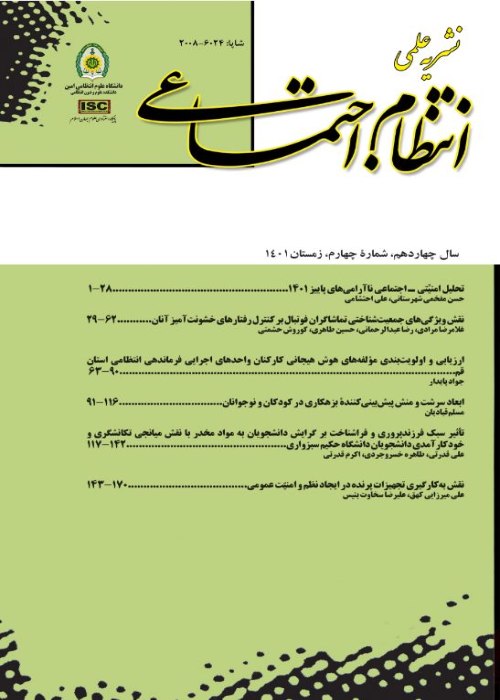The Police Legal Gaps at Law Enforcement Checkpoints
Author(s):
Article Type:
Research/Original Article (دارای رتبه معتبر)
Abstract:
Background and objectives
The Criminal Procedure Code of 2013 plays a very important role in balancing the individual and social rights of individuals with the sovereign (state) rights. However, what is remarkable; the rapid pace of social change, the increase in the scope and speed of the transfer of crimes, the change and complexity of the methods of committing a crime, and the introduction of emerging crime into the social realm face the path to law enforcement with the challenges that are left behind in the elaboration of the horizons of thought. And the legal gaps caused by the lack of prediction of all the far and distant angles by the legislator also made the police, as one of the security and law enforcement agencies, to be encountered with major challenges, especially when dealing with cases of non-flagrant and suspicious offenses in the physical inspection of individuals as well as car safety inspections. The main purpose of this study is to identify the legal gaps in police checkpoints for the individuals and vehicles.
Methodology
This study has been carried out within the area of police command of Ardabil province. The statistical population consisted of 68 individuals, including all staff members of the checkpoints of Ardabil province. Due to the limited statistical population, and for the purpose of reliability and validity of the research using the instrument of a researcher-made questionnaire, the staff members of the narcotic police, criminal investigation police, the anti-smuggling staff members, and the police experts of the police and prevention police of the province were also questioned.
Findings and results:
In this study, we found that there are some legal gaps in the physical inspection of individuals, vehicles, etc. at the checkpoints. The most important challenges of the checkpoints in the new Criminal Procedure Code are as follows: judicial coordination to conduct physical inspections in dealing with suspects, the existence of inconsistent perceptions about the calling-for-deeds and forbidding-the-evil-doing agents regarding the privacy of personal cars, and the uncertainty of the discovered unauthorized assets.Keywords:
Language:
Persian
Published:
Entezam - e - Ejtemaei, Volume:10 Issue: 2, 2018
Pages:
251 to 272
magiran.com/p1899314
دانلود و مطالعه متن این مقاله با یکی از روشهای زیر امکان پذیر است:
اشتراک شخصی
با عضویت و پرداخت آنلاین حق اشتراک یکساله به مبلغ 1,390,000ريال میتوانید 70 عنوان مطلب دانلود کنید!
اشتراک سازمانی
به کتابخانه دانشگاه یا محل کار خود پیشنهاد کنید تا اشتراک سازمانی این پایگاه را برای دسترسی نامحدود همه کاربران به متن مطالب تهیه نمایند!
توجه!
- حق عضویت دریافتی صرف حمایت از نشریات عضو و نگهداری، تکمیل و توسعه مگیران میشود.
- پرداخت حق اشتراک و دانلود مقالات اجازه بازنشر آن در سایر رسانههای چاپی و دیجیتال را به کاربر نمیدهد.
دسترسی سراسری کاربران دانشگاه پیام نور!
اعضای هیئت علمی و دانشجویان دانشگاه پیام نور در سراسر کشور، در صورت ثبت نام با ایمیل دانشگاهی، تا پایان فروردین ماه 1403 به مقالات سایت دسترسی خواهند داشت!
In order to view content subscription is required
Personal subscription
Subscribe magiran.com for 70 € euros via PayPal and download 70 articles during a year.
Organization subscription
Please contact us to subscribe your university or library for unlimited access!


